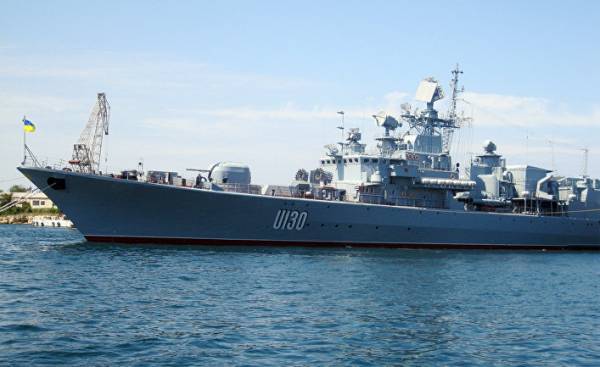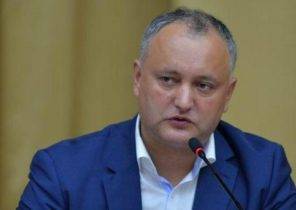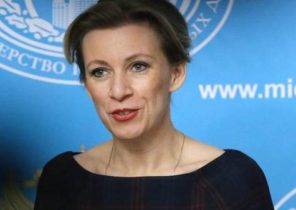
Winston Churchill said: “Learn the history, learn the history. In history are all the secrets of political sagacity”. Wise words, history always provides the politicians the opportunity to make strategic lessons to identify errors in order to avoid their recurrence in the future. The lessons are sometimes painful, unpleasant, but that their value becomes smaller.
How did the Ukrainian Navy
2017 was supposed to be a historical Rubicon in relations of Ukraine with Russia — in accordance with basic Russian-Ukrainian agreements on black sea fleet (the Agreement on the status and conditions of stay of the Russian black sea fleet on the territory of Ukraine; Agreement on parameters of division of the black sea fleet; Agreement on mutual settlements associated with the division of the black sea fleet and stay of the BSF of the Russian Federation on the territory of Ukraine, hereinafter — Agreement), may 28 this year, the last Russian ship was supposed to leave the roads of Sevastopol. Had to… But not left.
There is another spring date. In early April of this year marked 25 years since the signing of the decree of the President of Ukraine “On urgent measures for the construction of the Armed forces of Ukraine”, in the second paragraph, which was tasked to “form the Naval forces of Ukraine on the basis of the black sea fleet”. In a tragic 2014 in Sevastopol and Crimea, they will lose 70% of fighting strength, the infrastructure and the main points of their home…
The question arises: why stay of the Ukrainian Naval forces in their own land was temporary, although she had to leave the Navy another state? If we want to not shaded or colored response should look in retrospective, first of all, what are the decisions, political and military, were taken and what actually happened, because the past has a systemic link with the present and influence it. By and large, the historical lessons do not need to answer the question “who is guilty”, but mainly so as not to repeat the mistake in the future. Learn the history…
1992-1996 remembered active formation of Naval forces of Ukraine with the awesome support of the Ukrainian people, who had the optimism and energy of the Ukrainian Navy. It all started with the organizing group and the first commander — Vice-Admiral Boris Kozhin. He saw and created the Ukrainian Navy surrendered to the state, motivated and professional — then the call of the commander on his heart seamen-Ukrainians went to Sevastopol from different cities of the former USSR to build a fleet of Ukraine.
Received completed Ukrainian shipbuilders warships, giving the military control bodies and units of the Ukrainian Navy have started active preparation of the forces at sea to acquire the necessary combat and operational capabilities was conducted transatlantic voyage of a group of Ukrainian warships to the coast of the United States and many other activities. Sailor burned naval service and tried to do everything possible to accelerate the creation of a full naval group of Ukraine — no one believed the day or night. In a short time were formed hundreds of naval organisms, created training and implemented combat training formed crews and units. Carried out in 1996 on the initiative at that time Deputy Minister of defense of Ukraine — commander of the Ukrainian Navy, Vice Admiral Volodymyr Bezkorovainy (died in 2017) naval tactical exercises “Sea-1996” reaffirmed the Ukrainian Navy created!
It should be noted that the construction of the Ukrainian Navy at the specified time was accompanied by an active negotiation process between Ukraine and Russia regarding the distribution of the black sea fleet of the former Soviet Navy. Provided for the division of marine weapons, military equipment and property of the black sea fleet between Ukraine and Russia in the ratio 50: 50 with the further conclusion part that will remain of the Russian Federation on the territory of Russia. The withdrawal of Russian troops from the territory of Ukraine meet the Constitution of Ukraine, article 17 which prohibits the location of foreign military bases on the territory of the state, the stationing of foreign military formations on the territory of Ukraine. The Ukrainian side made a temporary (several years) the black sea fleet of the Russian Federation on the territory of Ukraine to create the appropriate coastal naval infrastructure on the black sea coast of Russia.
At the same time, naval theme, Russia has used “diplomacy tightening”. Provide a variety of solutions to the issues of the black sea fleet, but without separation. One of these options was considered a uniform BSF, which will protect the interests of both Russia and Ukraine. Of course, under Moscow’s control. Even suggested the withdrawal of naval forces of Ukraine outside the Peninsula. At the same time, the Ukrainian military sailors stood on government jobs because they were well aware of the responsibility for the Crimea and Sevastopol, the protection of the marine borders of the state. This is not like a Northern neighbor. Were performed some action with the involvement of misdirected Kazachkov (by the way, if the SBU worked effectively in advance). Sometimes it came to the use of weapons — we should remember the events of April 1994, around a hydrographic ship of the black sea fleet “Cheleken” that illegally took out the navigation and hydrographic equipment from Odessa in Russia, and the former 318 division of black sea fleet ships. “The division had used a weapon and acted against the Ukrainian government, so its days were numbered” — succinctly commented on the events in Odessa, the Deputy Minister of defense — commander of the Ukrainian Navy, Vice Admiral Volodymyr Bezkorovainy. It was an example of the victory of the state and military leadership, who should learn from today’s leaders. Unfortunately, in many dimensions-forgotten example. After the events in the shortest possible time on the basis of units of the black sea fleet in Odessa, Ochakov and Nikolaev was created by Western Maritime district (later Western naval base), Naval forces of Ukraine. In 2014 the funds of this naval base sailors took post-Crimea…
In General, given the dislocation in 1996, the Ukrainian Navy in Sevastopol, Crimea, Feodosia, Saki and Novofedorovka parts 32 army corps in Simferopol, Simferopol and Kerch, and the presence in Crimea of the troops of air defense and air forces of Ukraine, military-strategic advantage in the Crimea was Ukraine, but… at the highest level of diplomatic dives it was decided to go to the “compromises” in the interests of the Russian Federation. From the final version of the agreements was to remove the word “temporary” on stay of the black sea fleet on the territory of Ukraine. A huge part of the black sea fleet was counted in satisfaction of any energy debts of Ukraine to Russia and do not take into account distribution. Politico-military the purpose of stay of the BSF of the Russian Federation on the territory of Ukraine in inter-state documents were not included. Instead of a substantive-the object of renting a compact territory of military bases with the definition of the status of the black sea fleet of the Russian Federation and parts of Central subordination of the Russian armed forces is extremely minimized for the rent was given in long-term General use reinvestirovanie mixed with Ukrainian state agencies and troops of the Ukrainian land and infrastructure. At the disposal of the black sea fleet was a large part of movable property and coastal infrastructure of Sevastopol and the Crimea (Feodosia, Kerch, and guards), including in contravention of international standards all the navigation and hydrographic equipment on the coast of the Peninsula. Part of the marine weapons and military equipment, which distribution was supposed to depart Ukraine without explanation were not transferred (total expert value is not transferred to Ukraine only movable military property in 2003 prices were 237,5 million hryvnia).
Despite a number of unresolved systemic problems of the distribution of the black sea fleet, in 1997, Ukraine granted permission for a twenty-year stay neinfizirovanne military forces of the BSF of the Russian Federation on the territory of Ukraine with an uncertain purpose. You can argue about the conditions and consequences of this decision, but the strategic dimension is spelled out in the agreement format provided the possibility of implementation of the Kremlin’s strategy, “the permanent political and military presence in the Crimea”, first to gain time, and then to convert BSF into a powerful “Trojan horse” promotion of Moscow’s interests on the Peninsula.
It is a little known fact that while the Military Council of the Naval forces of Ukraine led by the commander resigned.
The first lesson
That is, the first lesson is that the Constitution is the basic law of direct action for direct execution if the country aims to be independent, sovereign state. It is impossible to cross the red lines of constitutional norms relating to the sovereign rights of the state and its territorial integrity. Ignoring this increases bezopasnosti risks and have delayed in time negative effect. It is therefore permitted contrary to the Constitution prolonged the deployment of foreign military forces on the territory of Ukraine without some international agreements with clear goals and limits his stay in the future worked against Ukraine. At the same time, state foreign policy in the sphere of national security and defence should not be based on any ideological clichés and “a warm embrace”, it should be build only on the basis of clearly identified national interests and state pragmatism.
The period from 1997 to 2002 was a time of survival of the Ukrainian Navy because of their chronic underfunding. Began to delay payments of the already small financial support to the Ukrainian military personnel. Lacked fuel not only for the sea — to scroll through “hot” weapons and machinery of ships, without which the material part quickly becomes inoperable. Conducted rolling blackouts of ships and units from the power supply that negatively affect the combat and technical readiness of naval forces. Paradoxically, few of the Ukrainian political establishment was the fact that the combat vehicle can be disconnected from electricity and water, it is extremely dangerous, given the presence of onboard munitions and missiles. It came down to placing a military guard around the transformer substations in order to avoid their disconnection from the management of RES. Affected if it is not the mind and heart of the Ukrainian Navy? Rhetorical question…
At the same time gradually build the capacity of the black sea fleet, whose power supplies were all in order. Contrary to the signed agreements, without the permission of Ukraine to the group of the black sea fleet in Sevastopol was included ship “Samum” with modern cruise missiles on Board, to increase the combat capabilities of the marine corps, has resumed activities 31 research and testing center of the Russian Navy in Feodosia. On objects, certain agreements for the dual use of the black sea fleet and the Ukrainian Navy, the Ukrainian armed forces were not permitted.
In 2003, a series of events that influenced the further development of the situation. With the advent to the leadership of defense Minister Yevhen Marchuk, the situation in the Ukrainian Navy began to change for the better. Evgeny Kirillovich like a professional with deep strategic vision, special attention was paid to it naval issues. Then the Ukrainian sailors switched to the logical organizational structure of the brigade, received the appropriate financial resources and began a major resurgence of the fighting strength of the fleet was made repairs of ships, raised in the air naval aircraft, began to operate the alerting system conducted a number of exercises in the sea and landfills, and joint operations with navies of NATO countries.
This year will also be remembered for the Russian-Ukrainian conflict around Tuzla island. Then the Kremlin has used elements of the hybrid approach: in Moscow is expected that the idea of the construction of the transition between the Taman and Crimean Peninsula via the island of Tuzla will be supported by broad segments of the Crimean population of the Peninsula. But this did not happen: the use of adequate political and military measures, in which Ukraine is quite vzaimosvyazano acted diplomatic and security components of the crisis, the situation was quickly neutralized at an early stage of its occurrence. It is the actions in advance to eliminate the crisis in the beginning of its development played a key role in localization and liquidation of the conflict. Unfortunately, this is a good lesson was forgotten by the Ukrainian political elite that opened the door for the unfolding of the tragic events in the Crimea in the winter-spring of 2014.
In turn, the subsequent development of the situation shows that Russia has drawn conclusions from the events around Tuzla. In 2005, the Kremlin moved to a strategy of “active influence”. In the Crimea intensified all kinds of movement Pro-Russian orientation, frequent Russian politicians and representatives of Russian nationalist movements. Subsequently, the degree of propaganda, which had been low, went up. It should be recognized that the work of institutions of culture and representatives of the BSF with target groups — youth, veterans and labor groups was organized and resourced. In some garrisons of the Ukrainian Navy was achieved informational advantage in favor of the Russian Federation with the possibility of appropriately oriented to impact on the consciousness of Ukrainian citizens. Cash collateral of sailors of the black sea fleet was at times more than Ukraine’s Navy. In 2008, the de facto operational and combat activities, contrary to the Russian black sea fleet signed between Russia and Ukraine agreements has ceased to be dependent on the legislation of Ukraine.
Is it possible that this was not seen in Kiev? Of course I did. And what was the reaction? She was… restrained. This soft wording of what was happening. One of the clearest examples of such policies — torn international exercises “sea breeze 2006”. Then the Ukrainian sailors was one on one with a paid anti-Ukrainian extremists, including foreign ones, who blocked the teachings, rocking buses and throwing stones at them. Crimean police stood by and… did nothing, “had orders from above”. The Ukrainian military seamen strictly forbade any opposition to the wording that “it is not the function of the Armed forces of Ukraine”. Nothing like? Then you were actively looking for the perpetrators of the naval staff — we love to beat the that strangers were afraid…
The second lesson
That is the second lesson needs to be studied in the context of the political framework of the state task the military: a bad practice to put them to cancel the process execution. It looks like a simultaneous “fire” and “Oh, not PLI”, contrary to the nature and meaning of military service. In General, state policy in the sphere of security and defense is not measured “discreet surveillance” or parade drums. At its core should be a professional public service with the center of gravity on the target group and strata, primarily the military. At best the content of the document at the state level to determine: “the Armed forces of Ukraine is responsible for…”. But in real life it will not work without political and military leadership aimed at creating/maintaining modern combat and operational capabilities of troops (forces), the encouragement of people in uniform, as well as meeting the needs of defence resources, because the newest generation of high-tech warfare is psychological and motivational. At the same time, in the context of socio-political threats, external nature, a special place should be given a professional warning the work of the special services and law enforcement agencies, which should be only the state, not the party. Either thus strengthening the survivability of military stratum, civil society and the country as a whole, or the high probability of losses and decline. The third is not given.
Since 2010 the situation has developed very dynamically. Moscow needed a legitimate political field for further strategic maneuvering and the use of advances in information campaign — signed on 21 April 2010 Kharkiv agreement provided it. In fact, this date became the Rubicon achievements of the Russian information and political-military advantage in the Crimea, and then the Kremlin could only effectively use it.
Unfortunately, while none of the Kiev authorities did not want to consider the real threats to national security associated with the target of Russian information-psychological company in Sevastopol and the Crimea with the participation of powerful institutions of culture of the black sea fleet of the Russian Federation, branch of Moscow state University in Sevastopol and many other structures created within the illegal sub-lease of objects of the black sea fleet.
In February 2013 a political rapprochement with Russia moved into the phase of building walls between our state and the West. At first it was in a latent, not an explicit format. The diplomatic game has been played on contrctors, were covered by the ostensibly pragmatic relations between Ukraine and NATO, participation in joint operations and exercises. But later began to wrap a program of military cooperation with the countries of the Alliance, soft impact on those who received the Western education began to be combined with hard measures.
Lessons from the annexation of Crimea is not the subject of this article, but sometimes the experts we hear that hybrid war began in 2014 in fact the Kremlin’s policy on Crimea turned into a systematic hybrid in 2010, when with the signing of the Kharkiv agreements opened the doors for the final preparation phase of changing the status of Crimea. Was not clear the architecture is conceived, perhaps, the chief was preparing a Federal-oriented way, but in a countdown time is already gone…
The third lesson
That is the third lesson is trivial relative to war as the continuation of policy by military means, but identificireba with the latest domain of warfare — information based on modern information and communication technologies to control people’s minds. It is in the disregard of the destructive power of this domain, you should look for the root of the mental unpreparedness of the Ukrainian military to defend the state from invasion “brothers” in February-March 2014. Destabilizing information campaign, centralized and personalized, synchronized by design, the time and place, with the intensified key messages and multiplier effects, built on deception, substitution and manipulation, it continues to act against Ukraine. In these circumstances, victory in the field of information cannot be achieved only by counter-propaganda and needs to be built on arguments and values with strategic communications — experience strongly suggests that the presentation of facts is important. The tree of a nation with roots in culture, tradition and experience won’t grow without sun and rain, which are of strategic communication. It is a question of survivability of the state, which requires appropriate resources, professional, motivational and material.
There is another aspect of this lesson. The transition of any conflict into a hot phase does not occur suddenly, it is always preceded by preparation, which contains vectorial indicators. These indicators show that the situation changes dramatically in the direction of conflict. The ability to promptly recognize the marked indicators and make appropriate decisions is an important element of political wisdom and sagacity. In this period, the relationship between politicians and the military must be filled with clear strategic guidelines with the delegation of authority to the military leadership in power to curb the hot phase, in case of its occurrence — prompt, adequate military response, especially in the early stages, when the situation is changing rapidly and there is the surprise factor. Unfortunately, the signing and approval at the legislative level of Ukraine illogical from the point of view of a state filled with potential destabilization of the Kharkiv agreements closed doors for an adequate threat assessments and response on the part of the security Sector and defense of Ukraine.
Okay, will tell the curious reader, but in March 2014, Russia denounced the Agreement on Russian black sea fleet, including Kharkiv. Why Ukraine didn’t you?
Try to identify the lesson.
In fact, from Russia it was not a denunciation and unilateral cancellation of international agreements that constitute a serious violation of international law. Unilateral move of the Kremlin, the Ministry of justice and Ministry of foreign Affairs of Ukraine made the decision not to do something and file a lawsuit for the wrongful actions of the Russian Federation in the international court of justice. This was stated by justice Minister Pavel Petrenko at a briefing at the Cabinet of Ministers on 1 April 2014. “According to international practice, such actions by international courts are not recognized. We won’t none of these agreements to denounce”, he said. He added that the Ukrainian side to these agreements are the “evidence base regarding confirmation of rights of Ukraine in the courts, including rights to compensation for damages from the Russian Federation”.
Following the logic of the marked position from the Ukraine hot on the trail had to be running the target roadmap:
• the first step after receipt of a corresponding note from the Russian Federation about cancellation of the Agreements, the Ukrainian side expects the losses incurred by Ukraine referred to the unilateral actions of the Russian side, and within three months Moscow formulates its position (roughly, June 2014);
• the second step in the case of suppressing/delaying the last Ukrainian is a lawsuit in the international court of justice (tentatively September 2014);
• and the third step — consideration of the claim in the high court and the verdict (roughly until the end of 2016).
It should be noted that Ukraine in this process could have pretty good arguments — a lot of things possible to use in many Russian side signed and sealed bilateral protocols within the framework of the meetings of the Russian-Ukrainian sub-Commission on the presence and functioning of the BSF of the Russian Federation on the territory of Ukraine. Due to the targeted nature of the claim regarding the violation by Russia of Agreements on black sea fleet may be expected the decision of the high court for cancellation of their illegitimate cancellation of Russia and the compensation to the Ukrainian side caused by the unilateral actions of Russia losses.
Three years have passed. And here the question arises: what is the status of this? I would like to get an answer from the Ministry of justice, Ministry of foreign Affairs or the Ministry of defence, as this should be part of the strategic communications between authorities and society on key national security issues.
Again an excursion into recent history. Earlier the foreign Ministry of Ukraine on issues of stay of the black sea fleet on the territory of Ukraine was engaged in a special unit. The Ukrainian delegation at the talks on black sea fleet of the Russian Federation was represented by first Deputy foreign Minister of Ukraine. Have been a huge amount of negotiations, we have accumulated vast experience, there was a system database. Now the division was reduced, people are fired. In defense of a similar situation. No people — no problems?
But the problems, unfortunately, there are, as the relevance of the topic does not disappear. First of all it concerns the training in accordance with the current diplomatic strategy fully justified claim materials. An important issue is the interpretation of certain wording of the Agreements, without which it is difficult to hope for a successful trial in the International court of justice. In conditions when Russia has revoked the Agreement in accordance with article 24 of the Agreement “On the status and conditions of stay of the Russian black sea fleet on the territory of Ukraine”, it remains the issues of Ukrainian part of Ukrainian-Russian intergovernmental Commission on cooperation, she should come and explain. As the sub-Commission headed by the first Deputy Minister of defense of Ukraine. It is painstaking work, which was supposed to be a reasoned position of Ukraine in the international court. Did?
The fourth lesson
That is the fourth lesson relates to wisdom and professionalism in the public business are of paramount importance. Political wisdom should follow the public interest, and not to neglect them. In turn, the level of professionalism is measured by results, and not the number of papers that loves the Ukrainian bureaucracy. At the same time, wisdom and professionalism are not transmitted with the genes from the previous generation or on orders from above. They are the result of years of professional growth from primary to higher positions (to understand how downstairs, and then upstairs do not need to bring down the “crown” with a shovel), life experience and work. This is all the questions of the state elite. In her youth, and ambition is great, because it’s the future. But the future is created by today’s action, in which wisdom and professionalism are important because without them, civilization choice can be a slogan, and the prospects look uncertain.
Before joining the office of the Secretary (our Minister) of defense, U.S. marine General James Mattis told military that they are “extreme 600 meters” policy. But the actions of the military in these far away policies directly depend on the content of the policy and its implementation strategies. It was here, and not in the hot air with a loud slogans, appeals or promises, should be the center of gravity of the activities of politicians.
Of course, there are no perfect people and don’t need the political elite of any country to identify with fairy tale characters who are quickly overcome any difficulties and challenges. Life is never simple and without errors — they are for everyone. Nothing in the formation of personality does not fall from the sky, and is achieved by hard work, self-analysis and delivery of lessons. But there are indicators that characterize the wisdom, maturity and sagacity of the elite of any country. These indicators may be different, but at least one of them is fundamentally important — it is real significant public achievements. They form a successful policy of security and defence of the country in which the military will be implemented successfully “extreme 600 meters,” the success of the politicians and, most importantly, successful history of the country as a whole.
Learn the history…
Igor kabanenko, Admiral, an expert on defence and security policies.







